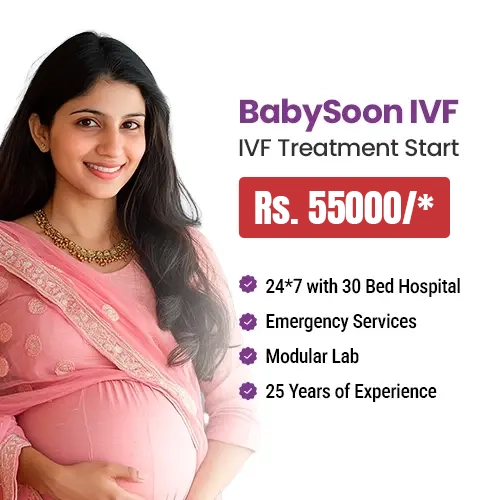

You might be familiar with some of the persistent women's issues.One of the most frequent issues is fibroids, which are commonly known as uterine fibroids. This is one of the common forms of noncancerous growth. Uterine fibroids are made up of uterine muscle and connective tissues.
However, if you're looking for the most effective treatment, go to BabySoon, which is known for providing the best fibroids treatment in Delhi.We retain all the latest technologies and methods for providing the best facilities to our clients.
Moreover, you might be amazed by the fact that over 40–80% of women are suffering from fibroids. There are numerous reasons, such as obesity, genetic problems, and irregularities in the menstrual cycle. On the other hand, at BabySoon, we have a keen understanding of your problem and have all the methods necessary to resolve it. Most importantly, we provide all the treatments at the best possible prices. Now, book your call with us.
Sperm movement may be hampered by fibroids that are close to the cervix, or mouth of the uterus.
When fibroids are big and close to the tubes, the tube-ovarian-uterine relationship is distorted. This might affect the ovum (egg) pickup after ovulation and the embryo transfer to the uterine cavity.
Submucosal fibroids in the uterine cavity prevent the cavity's lining from developing, which is necessary for embryo implantation. In certain cases, the fibroids occupy a lot of space in the cavity, making it difficult for the embryo to attach and develop, leading to repeated miscarriages.
BabySoon is entitled as one of the Best Uterine Fibroids Treatment Hospitals in India. We aim to provide reliable and affordable services throughout India. Over the years, with our pioneering experience, we have witnessed notable growth to satisfy our clients. Moreover, we provide proper guidance in the simplest form and provide surveillance after the treatment. Now, it’s your turn to book an appointment with us.
Intrauterine Insemination (IUI) is a basic fertility technique in which processed (concentrated and washed) sperms are implanted into a woman’s uterus during ovulation to boost her chances of becoming pregnant.
Fertilization (meeting of egg and sperm) occurs in the body during IUI (fallopian tubes). IVF, on the other hand, is carried out in a laboratory.
The success rate of IUI is approximately 20%.
Stimulated IVF- A woman takes medicines/injections for 9 to 12 days to stimulate both of her ovaries to generate and mature multiple egg follicles. During the stimulation phase, a physician will do ultrasounds to track the follicles growth until they reach a specified size (18-22mm). Natural IVF- In this cycle, instead of stimulating your ovaries to produce multiple eggs, the Natural Cycle IVF Process is meant to select that one egg that your body produces naturally.
Multiple pregnancy risk is reduced. Reduces the high costs associated with stimulation medicines. Reduces the risk of drug-related adverse effects.
Controlled ovarian hyper stimulation is a procedure in which the patient’s ovaries are stimulated for 10-12 days with hormone injections (gonadotrophins) in order to obtain the highest number of mature oocytes (eggs).The response to these injections is tracked by ultrasound, and after the cohort of follicles reaches 18-22mm (minimum 4-5), a trigger injection is administered, followed by ovum pickup (egg collection) 34-36 hours later.
Ovaries of some females might respond excessively to the fertility drugs. OHSS(Ovarian Hyperstimulation Syndrome) occurs in a minority of females who overrespond, symptoms of which include, vomiting, nausea, severe discomfort, abdominal distension and dehydration. Note: The patient should immediately notify the clinician in case of such symptoms
A couple is considered to be infertile when they fail to conceive after one year of unprotected sexual intercourse.
No, babies born out of IVF do not have any genetic abnormalities.